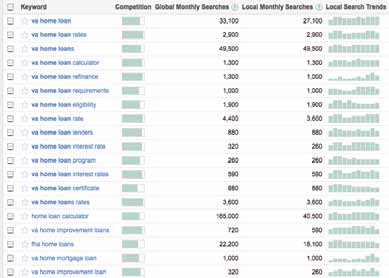Content key to site rankings
There’s a saying that experts on search engine optimization often invoke: If you build it, they might not come.
The Internet provides a virtually limitless customer base, but with billions of websites and online content growing exponentially each year, the competition for online viewers is constantly rising, and your website’s search engine ranking is more important than ever.
But getting to the top of search results is complicated, and the field constantly evolves. Google changes its algorithm for producing search results more than 300 times a year and is always on the lookout for sites that try to game its system.
Although the techniques used to optimize a site’s rankings can get technical, Rob Stretch, VAMortgageCenter.com’s search marketing manager, said good search engine marketing is really not all that different from regular marketing.
“When you’re thinking of search engine marketing, you’re trying to preemptively think of what the customer might be asking,” he said.
Stretch is responsible for making sure people searching for a mortgage backed by the VA Administration see VAMortgageCenter.com and, hopefully, go through the company to get the loan. He leads a staff of four tasked with boosting VAMortgageCenter.com’s rankings in Google. To do so, they produce content and expand the site’s online presence so the link appears on computer screens after people search for phrases as different as “VA home loan” and “military scholarships.”
Stretch calls search engine optimization, commonly known as SEO, “both an art and a science.” Although it’s key to build your site so that important terms are prevalent (in the case of VAMortgageCenter.com, “VA loan” or “VA home loan”), it’s equally, if not more, important to produce quality content for users.
“People back in the day used to, if they wanted to rank for running shoes, some people would buy runningshoesrunningshoes.com and have “running shoes” three times in every paragraph,” he said. “Blatantly, they’re trying to trigger the search engines. But Google has a spam team that cracks down on that kind of stuff.”

For instance, Stretch said, VA Mortgage Center may develop a comprehensive guide for VA loans. Stretch can then share that content with a host of military bloggers, financial or mortgage-related websites. If it’s good content that those site operators think their readers might want to use, then they will link back to VAMortgageCenter.com. Those links are the bread and butter of SEO directors and play a key part in the algorithm Google uses to rank sites.
“To be in the long run, it’s not about gaming the system or gaming Google,” Stretch said. “It’s about making a usable site.”
Although other search engines’ algorithms need to be taken into account, the gold standard for SEO is Google because of its market share, Stretch said. Google took off during the dawn of the Internet because of an innovative addition to its algorithm; rather than just using outside links to rank sites, Google makes links from sites it deems more authoritative worth more than other links.
Government sites, education sites and brand leaders — Nike, for shoes, for instance — are considered “authorities” in their fields. To get authoritative sites to link to yours, it takes quality content, Stretch said.
“If you’re an authoritative site, you’re not going to link to some spam site,” he said.
It also requires relationship building. Stretch regularly goes to conferences on military blogging, where he meets influential people in that field who could yield a link in the future.
But staying up on tweaks Google makes to its search algorithm is important, too. Sometimes, he said, he can simply run his own tests for changes by performing a Google search himself. But he also attends conferences and stays current on SEO news.
One of the big expected shifts, he said, is the integration of social media into the search engine algorithms. Bing already uses Twitter results, he said, and there is talk that Google might eventually incorporate “likes” on Facebook into its formula determining site rankings.
SEO is not something that’s really taught in school, Stretch said. But one thing is certain about the constantly fluctuating art: “SEO is an ever-changing field.”


